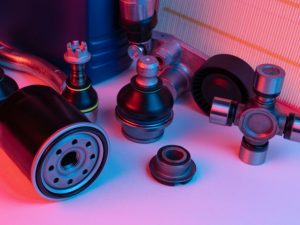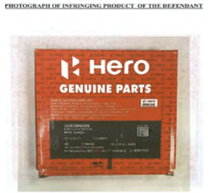 In a recent legal battle between Hero Investcorp Private Limited and Anr vs Diamond Autos, the Delhi High Court has issued a decree of ad interim injunction restraining a defendant from manufacturing, stocking, selling, or offering for sale products bearing trademarks identical or deceptively similar to those of the plaintiff’s marks
In a recent legal battle between Hero Investcorp Private Limited and Anr vs Diamond Autos, the Delhi High Court has issued a decree of ad interim injunction restraining a defendant from manufacturing, stocking, selling, or offering for sale products bearing trademarks identical or deceptively similar to those of the plaintiff’s marks .
.
The plaintiffs, Hero Invest Corp Private Limited and Hero MotoCorp Limited, leading manufacturers in the automotive industry, sought a legal remedy against the defendant, who runs a business selling auto parts in Ludhiana, Punjab.
On June 13th, 1966, plaintiff No. 2 filed an application under class 12 to extend its trademark ‘HERO’ for scooters, motorcycles, and their parts. The Registrar of Trademarks allowed the application, and since then, plaintiff No. 2 registered different trademarks under its name, including  .
.
It was alleged by the plaintiffs that the defendant was engaged in selling counterfeit auto parts, including Disk Clutch Friction, bearing marks identical to the plaintiffs’ trademarks. They provided evidence demonstrating the deceptive similarity between their products and the defendant’s, including packaging and other associated elements. A comparison of the plaintiff’s product and that of the defendant is provided as follows:
Plaintiff’s products:


Defendant’s products:


Upon examining the evidence presented by the plaintiffs, the Court found merit in their claims and granted an ex-parte ad interim injunction until the next hearing date. The injunction prohibited the defendant and its associates from engaging in any activities involving the manufacturing, stocking, selling, or offering for sale of auto parts bearing the plaintiffs’ trademarks or any similar trade dress under the trademark ‘HERO’ and/or any other mark identical or deceptively similar to it, and/or any other ‘HERO’ marks of the plaintiffs.
Additionally, the Court allowed the application filed by the plaintiffs and ordered the appointment of a Local Commissioner with a direction to visit the defendants’ premises and carry out the following mandate:
- The Local Commissioner, along with counsel for the plaintiffs and a responsible representative of the plaintiff, will search and inspect the premises. They will seize products with the plaintiffs’ trademark, logo ‘HERO’, and device marks. They will release the seized products on Superdari to the defendant.
- The defendant must allow access to the premises. The execution of the commission should not disrupt the defendant’s business except for the purposes of the commission. The commission should be executed peacefully.
- The police are directed to provide necessary assistance and protection. If the goods are in any other location, they can execute the commission there too.
- The Local Commissioners will communicate the order to the defendant and serve a copy of the order at the time of execution.
The plaintiffs were directed to bear the expenses associated with the Local Commissioner’s fee of Rs. 1,50,000/-, travel, lodging, and other miscellaneous expenses incurred during the execution of the commission. The Local Commissioner was instructed to file a report within three weeks of executing the commission.
This ruling by the Delhi High Court highlights the significance of safeguarding intellectual property rights and preventing the sale of counterfeit products in the market. This decision acts as a warning to those involved in illegal practices and maintains the credibility of trademarks and copyrights in the automotive industry.
Authors: Manisha Singh and Kratika Patel
First Published By: Lexology Here



